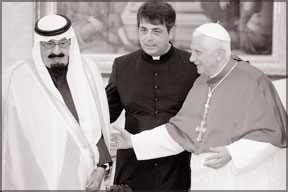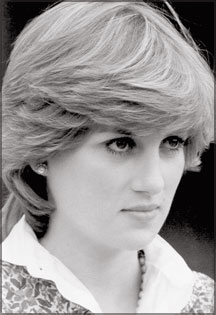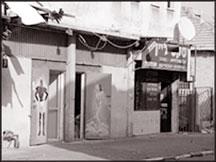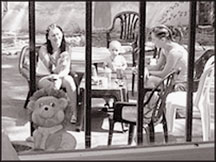 Saudi King, Pope discuss Middle East peace
Pope Benedict and Saudi Arabia's King Abdullah held a historic
meeting on Tuesday and discussed the situation of minority Christians in
the Islamic country where the Vatican wants them to have more freedom.
At the first meeting between a Pope and a Saudi monarch, the two also
discussed the need for greater collaboration between Christians, Muslims
and Jews and prospects for a Middle East peace.

They spoke for about 30 minutes in the Pontiff's private study with
the help of interpreters in what both the Vatican and reporters
described as a cordial atmosphere.
A Vatican statement said: "The presence and hard work of Christians
(in Saudi Arabia) was discussed" - seen as a clear reference to the
Vatican's concern over the Christian minority.
Vatican sources said before the meeting that they expected the Pope
to raise his concern over the situation of Catholics and other
Christians in Saudi Arabia.
The Vatican wants greater rights for the 1 million Catholics who live
in Saudi Arabia, most of them migrant workers who are not allowed to
practice their religion in public.
They are only allowed to worship in private places, usually homes,
and cannot wear signs of their faith in public.
King Abdullah, custodian of Islam's holiest sites in the cities of
Makkah and Medina, wore his traditional white robes.
The Vatican said other topics discussed included inter-cultural and
inter-religious dialogue and "collaboration among Christians, Muslims
and Jews for the promotion of peace, justice and spiritual and moral
values, especially those which support the family".
The Pope and the king also discussed the Middle East, particularly
the need to find "a just solution to the conflicts that afflict the
region, in particular the Israeli-Palestinian (conflict)".
Muslims around the world protested last year after Benedict, speaking
at a university in his native Germany, used a quote that associated
Islam with violence.In that speech at a university in Regensburg in his
native Germany, Benedict quoted the Byzantine emperor Manuel Paleologus
as saying to a Muslim:
"Show me just what Mohammed (PBUH) brought that was new, and there
you will find things only evil and inhuman, such as his command to
spread by the sword the faith he preached."
The Pope later said he was misunderstood and has several times
expressed esteem for Muslims.
At the end of the meeting, the king gave the Pope a gold and silver
sword studded with precious jewels, in keeping with a bedouin custom the
Saudis also follow when foreign leaders visit their country.
The king also presented Benedict with a small silver and gold statue
depicting a palm tree and a man riding a camel.
In an interview on the eve of the meeting, the bishop in charge of
Catholics in Saudi Arabia called on the country to guarantee more
freedom and security for minority Christians and allow more priests in
to minister to the faithful.
"What I am hoping is that there can be more security and freedom for
our people in a very low profile manner," said Bishop Paul Hinder, a
Swiss national who is based in Abu Dhabi.
"I am not expecting to be able to build a cathedral. But at least (we
need) the freedom to worship in security," he said.
Vatican officials often ask why church construction is banned in
Saudi Arabia while Muslims can build mosques in Europe.
Dawn, Pakistan
Diana crash 'virtually impossible to engineer'
By Will Pavia
Shortly before it smashed into the 13th pillar of the Alma Tunnel,
the Mercedes carrying Diana, Princess of Wales and Dodi Fayed collided
with a white Fiat Uno, an incident that would be "virtually impossible"
to engineer deliberately, an accident reconstruction specialist told
their inquests yesterday.
After weeks of innuendo over the mysterious white car and accounts
from witnesses attempting to recall the vehicle, its driver and the dog
in the back, the jury were hearing the confident testimony of a British
police officer and holding solid fragments of plastic, said to be part
of a Fiat Uno's brake light.

Anthony Read, a senior collision investigator from Scotland Yard, was
discussing his investigation of the accident with two other experts for
Lord Stevens's investigation into the deaths of the Princess and Mr
Fayed.
He said that all three experts agreed that there was a collision near
the entrance to the Alma Tunnel between the Mercedes driven by Henri
Paul and a white Fiat Uno. The jury was handed three bags containing 21
red and 55 clear pieces of plastic.
Mr Read said that all three investigators had been satisfied that
"the red pieces of plastic were from the rear brake cover of the
left-hand side of a Fiat Uno, as fitted . . . between May of 1983 and
September of 1989". The car that has never been traced conclusively.
They were equally satisfied that the clear pieces were from the
front-right indicator of the Mercedes, he said.
The wreck of the Mercedes itself had been brought to Britain in two
shipping containers for examination. Mr Read said that they had found
"indications of white paint" on the crumpled front right wing of the
car, as well as black plastic that "scientific examination showed had a
composition consistent with the rear bumper of a Fiat Uno" of the same
period.
Mr Fayed's father Mohamed, the owner of Harrods, believes that the
Fiat played a key role in a plot to murder the Princess.
The three investigators examined whether this collision could have
been deliberately engineered. Mr Read thought it "virtually impossible".
He said that the Princess and Mr Fayed were in a Mercedes that was twice
the weight of a Fiat Uno, and travelling twice as fast.
"Had the impact been any more than a glancing blow the effect on the
Fiat is going to be much greater than any sustained by the Mercedes."
The driver of the Fiat was far more likely to be killed, he said.
Mr Read said that it was "complete luck, if that is the right word,
that the vehicle swerved right and then left", striking the very corner
of pillar 13, a narrow point of impact which meant that the Mercedes
bonnet "didn't deform quite as progressively as it was designed to" to
absorb the impact.
The car struck the pillar at 60-70mph, he said. Had the passengers
worn seat belts they would have had "an increased chance of surviving",
and had the car also been travelling at the speed limit of 31mph "I
think we can almost guarantee it would be survivable", he said.
He allowed that much of their investigation was based on "secondhand"
evidence, on a day when the inquests were being denied first-hand
evidence.
The coroner, Lord Justice Scott Baker, expressed his "disappointment"
that the paparazzi who pursued the Mercedes that night would not be
compelled by the French authorities to give evidence.
The French had decided that to compel them to do so raised questions
of "order publique" as it could "damage relations between the media, the
government and the general public", the coroner said.
Michael Mansfield QC, who represents Mr Al Fayed, argued that there
was "missing film" from the paparazzi about which the photographers had
never been questioned, and that the citation of "order publique" was
incorrect.
Timesonline, UK
Coal conversion dilemma for US
The US is the world's greatest per capita emitter of carbon dioxide
with each US citizen responsible for 20 tonnes of gas annually - the
world average is less than four.
As global warming campaigners increase pressure on the White House to
cut emissions, policymakers in the US have other concerns: they say
there is a threat not just from climate security but from what is known
as energy security.
"We're expending tens of billions of dollars annually on the purchase
of oil from other countries," explained Congressman Rich Boucher, a
member of Congress's Energy and Commerce Committee.
"Most of those dollars flow to places that are not particularly
friendly to the United States. This would be the Middle East primarily.
"I think our national security is affected because we simply can't
offend; we have to encourage the continued flow of oil to this country."
Congressman Boucher believes it is vital the US achieves a higher degree
of energy self sufficiency for security and economic reasons.
America has a plentiful source of domestic energy - coal. Half of the
US's electricity comes from coal-fired power stations, but amid the
political debate over climate change the fuel is not seen as
eco-friendly.
The solution, according to Congressman Boucher, could be liquid coal
- a type of oil produced by heating the mineral to high temperatures to
squeeze out the oil.
It is a tempting prospect for politicians to use a home-grown fuel
source to replace imported oil, and keep cars on the road, planes in the
air.
The US Air Force wants coal-to-liquid to replace jet fuel in its
fleet.
Rich seam
As might be expected, the coal producers and mining unions are
lobbying hard. Corey Henry, a lobbyist for the Coal-to-Liquid Coalition,
highlighted its appeal.
"The way you sell this idea is by asking members of Congress if they
want to gamble on letting America continue to grow ever more reliant on
imported oil that, as everyone knows, can occasionally come from areas
of the world that present some difficulties for the United States."
But green groups are horrified.
Kert Davies, from Greenpeace, said coal-to-liquid is one of the
dirtiest energy sources available, pointing out that the only country
currently using it on a large scale is South Africa. The technology was
developed under apartheid when the country was starved of oil by
sanctions.
"It [liquid coal] has double the greenhouse gas emissions of gasoline
because of the tremendous energy involved in the process," he added.
Another green campaigner, Jennifer Morgan, of lobby group E3G, is
optimistic that the debate is shifting in the US, with energy efficiency
and renewable sources being looked at in a new light.
But she added: "The danger is that you are also trying to include
coal and do coal-to-liquid programmes.
"One of the key goals has to be that climate security wins out
against the coal-to-liquid goal otherwise we have no chance to avoid the
worst impacts of climate change."
'No alternatives'
Meanwhile supporters of liquid coal such as Congressman Boucher admit
its green limitations.
The coal-to-liquid plant in South Africa is said by some to be the
world's greatest point source of CO2 emissions.
The congressman agrees that carbon sequestration technology would be
essential to capture and store the carbon and reduce damaging emissions.
However, he concedes that the technology to do that has yet to be
developed.
The coal lobby is pinning its hopes on federal research funding for
an experimental project.
"We are conducting research programmes and demonstration programmes
to accelerate the day when it will be available in the United States -
even the most optimistic estimates say that year is probably 2025," said
Congressman Boucher.
BBC
UN chief and Pakistan envoy clash
The UN secretary general has clashed with the Pakistani ambassador to
the UN over President Pervez Musharraf's imposition of emergency rule.
Ambassador Munir Akram complained that Ban Ki-moon was meddling in
Pakistan's affairs by saying the country should return to democratic
rule.
 But after meeting Mr Akram, Mr Ban repeated his concerns. But after meeting Mr Akram, Mr Ban repeated his concerns.
He joined Pakistan ex-PM Benazir Bhutto in saying Gen Musharraf
should resign as army chief and hold elections.
Ms Bhutto, who has been negotiating a power-sharing deal with the
president, said on Tuesday that she had no plans to meet Gen Musharraf.
She is currently in Islamabad to discuss the crisis with other
opposition leaders.
'Regret'
Mr Ban relayed to reporters what he had told Mr Akram at their
meeting on Tuesday. "I again expressed my deep concern and regret [at]
what had happened in Pakistan.
"I also urged strongly that the Pakistani government should return to
democratic rule and procedures as soon as possible," Mr Ban said.
He called for the release of political leaders and lawyers detained
during the crisis in Pakistan and for restrictions on the media to be
removed.
But Mr Akram told the BBC that Pakistan's emergency did not have
implications for international peace and security and was therefore
outside the UN's remit.
"We think it's an internal matter and the United Nations has no
business to pronounce itself on that," he said.
The UN Security Council, meanwhile, has been silent on Pakistan, in
contrast to the stance it has taken recently over Burma, says the BBC's
Laura Trevelyan at the UN.
The Security Council's mission is to deal with threats to
international peace and security.
But Pakistan is seen as a country where the US has influence and is
actively applying pressure, our correspondent says.
Diplomats say it is not clear what the Security Council could do.
President Musharraf imposed emergency rule on Saturday.
Crackdown
The Pakistani mission to the UN said Mr Akram had explained to Mr Ban
"the grave and multiple challenges which had compelled the government of
Pakistan to declare the emergency".
It said the emergency measures were "restricted" in scope.
"Governance continues as close as possible to the constitution with
the cabinet, assemblies, governors and other organs of the state
functioning normally," the mission said in a statement.
"Pakistan remains committed to restore normalcy, rule of law and
democracy."
The Pakistani government's crackdown on pro-democracy activists
continued on Tuesday with dozens of arrests reported.
The country's sacked chief justice, Iftikhar Chaudhry, called for his
countrymen to "rise up" and restore the constitution.
BBC
Israel's fight against sex trafficking
by Raffi Berg
Marina rarely leaves her two-room home in northern Israel these days.
She is in hiding - wanted by the Israeli authorities for being an
illegal immigrant, and by the criminal gangs who brought her here to
sell her into prostitution.
|

Thousands of foreign women have been trafficked for sex in
Israel |
Marina - not her real name - was lured to Israel by human
traffickers.
During the height of the phenomenon, from the beginning of the 1990s
to the early years of 2000, an estimated 3,000 women a year were brought
to Israel on the false promise of jobs and a better way of life.
"When I was in the Ukraine, I had a difficult life," said Marina, who
came to Israel in 1999 at the age of 33 after answering a newspaper
advertisement offering the opportunity to study abroad.
"I was taken to an apartment in Ashkelon, and other women there told
me I was now in prostitution. I became hysterical, but a guy starting
hitting me and then others there raped me.
"I was then taken to a place where they sold me - just sold me!" she
said, recalling how she was locked in a windowless basement for a month,
drank water from a toilet and was deprived of food.
|

Brothels are illegal in Israel, but many still operate
openly |
That part of her ordeal only ended when she managed to escape, but
the physical and mental scars remain.
Last year, the United Nations named Israel as one of the main
destinations in the world for trafficked women; it has also consistently
appeared as an offender in the annual US State Department's Trafficking
in Persons (Tip) report.
While this year's report said Israel was making "significant efforts"
to eliminate trafficking, it said it still does not "fully comply with
the minimum standards" to do so.
Like Marina, some trafficked women are brought into the country
legally, while others are smuggled by Bedouins across the border from
Egypt.
In all cases, the traffickers - as many as 20 in the chain from
recruitment to sale - take away the women's passports before selling
them on to pimps.
Sometimes the women are subjected to degrading human auctions, where
they are stripped, examined and sold for $8,000-$10,000.
Sanctions threat
Prostitution in Israel is legal, but pimping and maintaining a
brothel are not.
The law however is not widely enforced and few brothels are closed
down.
|

For years, Israel treated trafficked women as criminals |
In Tel Aviv's Neve Shaanan district for instance, just a short walk
from the city's five-star tourist hotels, brothels masquerading as
massage parlours, saunas and even internet cafes, fill the side streets.
One such place even operates opposite the local police station.
There are bars on windows and heavily-built men guard the doors,
which are only opened to let customers in and out.
Inside, groups of sullen-looking women sit in dimly-lit rooms,
waiting for their next client.
Foreign women fetch the highest prices, with trafficked women forced
to work up to 18 hours a day.
For years, the absence of anti-trafficking laws in Israel meant such
activity - less risky and often more profitable than trafficking drugs
or arms - went unchecked.
"During the first 10 years of trafficking, Israel did absolutely
nothing," said Nomi Levenkron, of the Migrant Workers' Hotline, an NGO
which helps trafficked women and puts pressure on the state to act.
"Women were trafficked into Israel - the first case we uncovered was
in 1992 - and not much really happened," she said.
"Occasionally traffickers were brought to trial, but the victims were
arrested as well, they were forced to testify, and then they were
deported."
In 2000, trafficking for sexual exploitation was made a crime but the
punishments were light and its implementation was poor, NGOs say. It was
only after repeated criticism of Israel by the United States - and the
threat of sanctions - that authorities began to act.
Investigations into suspected traffickers increased, stiff jail terms
were handed down and Israel's borders were tightened against people
smuggling.
Campaigners say things began to change for the better in 2004, when
the government opened a shelter in north Tel Aviv for women who had been
trafficked for sex.
It marked a change in the way the state perceived them - as victims
of a crime rather than accomplices.
There are some 30 women at the Maggan shelter - most from former
Soviet states, but also five from China.
"When they come here they are in a bad condition," said Rinat
Davidovich, the shelter's director.
"Most have sexual diseases and some have hepatitis and even
tuberculosis. They also have problems going to sleep because they
remember what used to happen to them at night," she said.
"It's very hard and it's a long procedure to start to help and treat
them."
Police say their actions have led to a significant drop in the number
of women now being trafficked into Israel for sex - hundreds, rather
than thousands, a year - and they say the women's working environment
has improved too.
"There is a significant change in the conditions that the women are
being held in," said anti-trafficking police chief Raanan Caspi.
"In 2003 we used to find women who were being raped, incarcerated and
suffering violence. In 2007, the situation is completely different -
they get paid in most cases and the conditions that they're in are much
more humane."
But the true picture might not be so clear-cut.
Campaigners say increased police activity has also had an adverse
effect. Instead of operating openly in brothels, traffickers have become
more discreet, plying their trade in private apartments and escort
agencies, making the practice more difficult to detect.
"We've been keeping tabs on trends, in terms of, for instance, prices
of exploitative services," said Yedida Wolfe, of the Task Force on Human
Trafficking.
"Those prices have not gone up, which leads us to believe that the
supply of victims has not gone down.
"While government officials are saying that their efforts have
drastically cut the number of victims in the country, the NGOs on the
scene really don't feel that's true."
Israel might well have turned a corner in its fight against the
traffickers, but the battle is far from won.
BBC
|
